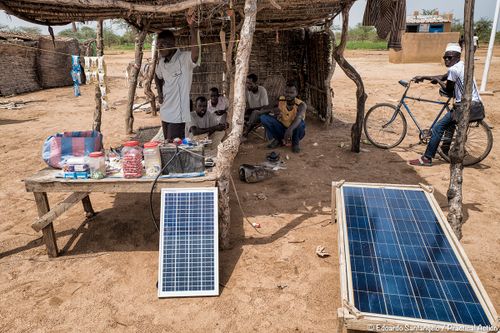Webinar Series: Sustainable Energy in Humanitarian Settings
Webinar Series Sustainable Energy in Humanitarian Settings

Today, over 130 million people are in need of humanitarian assistance due to conflict, natural disasters, and other complex global challenges. For many of these people, access to energy sources is critical for survival, and how they access it impacts their health, livelihoods, safety, and well-being.
Energy access for displaced people is not prioritized in the global humanitarian system. Current energy practices in situations of displacement are often inefficient, polluting, unsafe for users, and harmful to the surrounding environment. Moreover, institutional humanitarian operations such as water pumping, community lighting, and health clinics rely heavily on unsustainable fossil fuels, costing hundreds of millions of dollars annually.
Given the complex nature of humanitarian response and the challenges of integrating sustainable energy solutions into the humanitarian program cycle, there is not just one solution but a need for systemic actions to mobilise resources, build capacity and use the opportunity for sustainable energy solutions to enhance impact in sectors such as health, protection, food security, and WASH. read more
Against this background, key actors involved in displacement settings developed in 2018 the Global Plan of Action for Sustainable Energy Solutions in Situations of Displacement (GPA). It’s mission is to equip stakeholders with the capacity to mainstream sustainable energy solutions into programming, with the goal of delivering improved protection, dignity, and energy-related social, environmental, and economic benefits to displaced people.
As part of the outreach and capacity building activities of this movement, the International Committee of the Red Cross (ICRC) together with the Steering Group of the GPA and other partners are conducting a series of webinars on humanitarian energy issues to raise awareness and spread knowledge about different technologies, best practices and impacts.
Webinar: How to Integrate Renewable Energy Solutions into Humanitarian Response Planning?
Tuesday, Sept 28, 2:00-3:30 pm CEST (check your local time)
Register: https://register.gotowebinar.com/register/9132054715000331534
What is the need for and challenges of switching to renewable energy infrastructure in the humanitarian context? This webinar focuses on the decarbonisation of energy infrastructure and the associated challenges and opportunities in the humanitarian sector. Experts will share their insights on the need and processes for decarbonisation of energy infrastructure in humanitarian responses, how to establish an organisational baseline and roadmap for emissions reductions, and share financial projections on what is needed to decarbonise the humanitarian sector.
This webinar is the first of three webinars focusing on the decarbonisation of energy infrastructure in displacement situations, taking place in September, October and November 2021. The webinars will share knowledge and good practice on how to switch from fossil fuel-based energy sources to renewable ones; provide technical tools and processes to make the transition happen; and last, but not least, share lessons learnt and experience from the ground.
Speakers
Kathrine Alkjaersig VAG, International Committee of the Red Cross (ICRC)
With over 10 years of experience as an expert in environmental management notably at DuPont Sustainable Solutions, the strategic consulting company in sustainable energy E4tech and the Netherlands Environmental Assessment Agency, Kathrine Vad is since 2017 the ICRC’s Environment and Climate Change Advisor. One of the ICRC’s strategic objectives for 2024 is to bolster the sustainability of its humanitarian response which is why in her role, Kathrine strives to enhance the ICRC’s own environmental responsibilities and to further environmental and climate change practices within the ICRC’s assistance programmes”.
Maryanne is a sustainability professional with over 10 years’ experience working in the renewable energy, energy efficiency and climate finance sectors. She is currently a project manager within the GIZ Project Development Programme under the German Energy Solutions Initiative supporting the humanitarian sector with their objective of meeting net zero greenhouse gas emissions targets. She is also responsible for the project’s activities in Kenya and Ghana.
Philip Sandwell, Imperial College London
Dr Philip Sandwell is a Research Associate at Imperial College London and is currently seconded to the GPA Coordination Unit at UNITAR. His research focuses on techno-economic modelling and optimisation of solar minigrids, and the impacts and opportunities for decarbonisation in situations of displacement.
List of Past Webinars
- Landscaping : Capacity Building and Knowledge Sharing Opportunities (Feb 2021)
- Productive Uses of Energy in Humanitarian Contexts (Oct 2020)
- Powering Possibilities : Lessons Learned from Mini-grid Application in Conflict and Fragile Contexts (Sep 2020)
- Powering WASH : Renewable Energy for Water Supply in Humanitarian Settings (June 2020)
- Powering Humanitarian Health Operations : Sustainable Energy Solutions (May 2020)
- Energy Efficiency and Designing for Sustainability in Humanitarian Response (Feb 2020)
- Powering Humanitarian Facilities : Dialogue on Implementation Models (Jan 2020)
- Sustainable Energy for Household Cooking Needs in Humanitarian Settings (Dec 2019)
- Sustainable Energy for Powering Household and Community Lighting Needs in Humanitarian Settings (Nov 2019)
- Sustainable Energy for Essential Humanitarian Services : Outline of Energy Solutions and a Case Study on Solar Pumping (Sep 2019)
- State of Play : Sustainable Energy in Humanitarian Settings (June 2019)























